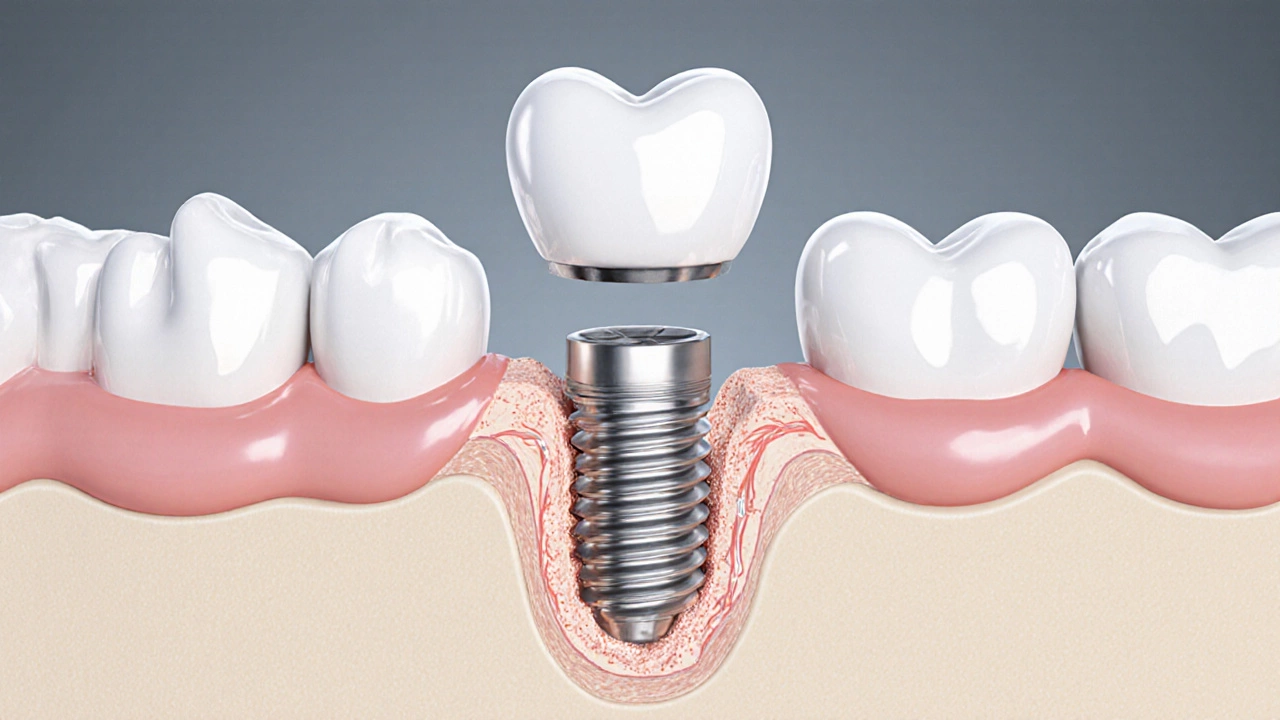
Quick Takeaways
- Average price for a single implant in India ranges from ₹70,000 to ₹150,000.
- Long‑term success rates exceed 95 % when proper oral hygiene is maintained.
- Choosing premium materials (titanium or zirconia) increases upfront cost but reduces future complications.
- Financing options, dental insurance, and medical‑tourism packages can lower the effective out‑of‑pocket expense.
- For most adults with a single missing tooth, the lifetime value usually outweighs the initial price.
What Are Dental Implants?
When people talk about Dental implants are permanent artificial tooth roots made of biocompatible material that fuse with the jawbone, the picture that often comes to mind is a metal post topped with a crown. The post, called an implant fixture, is surgically inserted into the maxilla or mandible. After a healing phase called osseointegration, a custom‑made crown is attached, giving the look and function of a natural tooth.
How Much Do Implants Really Cost?
Pricing varies widely based on location, practitioner experience, and chosen materials. In Bangalore’s leading clinics, the breakdown looks roughly like this:
- Consultation & diagnostic imaging: ₹2,000 - ₹5,000
- Implant fixture (titanium): ₹30,000 - ₹50,000; zirconia: ₹45,000 - ₹70,000
- Surgical placement: ₹15,000 - ₹30,000
- Bone graft (if needed): ₹8,000 - ₹20,000
- Crown fabrication & placement: ₹20,000 - ₹35,000
Adding everything up, a single‑tooth solution sits between ₹70,000 and ₹150,000. Multiple adjacent teeth can raise the total, but economies of scale often lower the per‑unit price.
Factors That Influence the Price
Understanding why the cost fluctuates helps you decide if it’s a worthwhile investment.
- Material choice: Titanium has a long track record and is generally cheaper. Zirconia offers superior aesthetics for front‑teeth cases but costs more.
- Bone quality: Patients with bone loss need grafts, adding both time and expense.
- Clinic reputation: High‑volume specialists can negotiate bulk pricing for implants, passing savings to the patient.
- Geography: Dental tourism hubs like Bangalore often provide lower rates compared to Western cities, without compromising quality.

Benefits That Add Value Over Time
Beyond the obvious cosmetic boost, implants bring functional and health advantages that affect the cost‑benefit equation.
- Preservation of adjacent teeth: Unlike bridges, implants don’t require grinding down neighboring teeth.
- Jawbone health: Osseointegration stimulates bone growth, preventing the bone loss that occurs after a tooth extraction keeps the facial structure intact.
- Longevity: With proper care, implants last 20‑30 years, reducing the need for repeat procedures.
- Improved chewing efficiency: Restores bite force to 90‑95 % of natural teeth, supporting better nutrition.
Potential Drawbacks and Risks
No medical procedure is risk‑free. Knowing the downsides helps you weigh the money you’ll spend.
- Implant failure rate: Studies in Indian populations report a 3‑5 % failure within the first two years, usually due to infection or poor bone integration.
- Higher upfront cost compared to removable dentures or bridges.
- Requires surgery: patients with certain systemic conditions (e.g., uncontrolled diabetes) face higher complication rates.
- Potential need for future maintenance, such as crown replacement after wear.
Comparing Implant Types
| Material | Typical Cost (per unit) | Durability | Aesthetic Appeal | Biocompatibility |
|---|---|---|---|---|
| Titanium | ₹30,000‑₹50,000 | 20‑30 years+ | Metallic gray (capped with porcelain) | Excellent; gold standard for osseointegration |
| Zirconia | ₹45,000‑₹70,000 | 15‑25 years | White, metal‑free - ideal for front teeth | Very high; suitable for metal‑allergy patients |
| Mini‑implant | ₹20,000‑₹35,000 | 10‑15 years | Usually capped, limited to small‑diameter cases | Good, but lower surface area for bone contact |
Financing, Insurance, and Dental Tourism
Many patients think the price is a wall they can’t scale, but several avenues soften the blow.
- Dental insurance: Some policies cover a portion of the fixture and crown if the procedure is classified as medically necessary.
- EMI options: Bangalore clinics often partner with banks for low‑interest instalments.
- Medical tourism packages: A single‑visit program can include consultation, surgery, post‑op check‑up, and a stay at a 4‑star hotel for under ₹80,000.
- Government health schemes: Certain state‑run programs subsidise implants for veterans and senior citizens.

Who Should Consider Implants?
Not everyone is a perfect candidate. Ideal candidates typically meet these criteria:
- Good overall health with controlled chronic conditions.
- Enough healthy bone to support the fixture, or willingness to undergo grafting.
- Commitment to oral hygiene-regular brushing, flossing, and dental visits.
- Desire for a permanent, natural‑looking solution rather than a removable prosthesis.
If you fall into any of these groups, the long‑term savings from avoiding bridges, dentures, or repeated bone grafts can be substantial.
Making the Decision: A Practical Checklist
Before you sign the consent form, run through this quick checklist.
- Get a detailed cost estimate that includes diagnostics, surgery, crown, and follow‑up.
- Ask about the dentist’s implant success rate and ask for before‑and‑after photos.
- Confirm whether your insurance covers any part of the procedure.
- Discuss financing plans or tourism packages if you’re traveling from another city.
- Schedule a post‑op maintenance visit to gauge long‑term comfort.
Following these steps helps you feel confident that the money you invest translates into lasting health benefits.
Bottom Line: Are Dental Implants Worth the Money?
For most adults in India, especially those living in urban centres like Bangalore, the answer is a resounding yes. The initial outlay may look steep, but when you factor in durability, bone preservation, and the avoidance of future prosthetic work, the value proposition shifts in favor of implants. With flexible financing, insurance possibilities, and competitive medical‑tourism rates, the financial barrier is lower than many assume.
Ultimately, the decision hinges on your personal health profile, aesthetic goals, and willingness to invest in a solution that can last decades. If those boxes check out, the money you spend today will likely pay off many times over in the years ahead.
Frequently Asked Questions
How long does the healing period take before I can get the crown?
Typical osseointegration takes 3‑6 months. Some clinics use early‑loading protocols that allow crown placement as early as 8‑12 weeks if bone quality is high.
Will my dental insurance cover implants?
Coverage varies widely. Basic plans often treat implants as cosmetic, but many premium policies reimburse up to 50 % of the fixture and crown when the tooth loss results from trauma or disease.
Are there any age limits for getting implants?
Implants are generally recommended for adults with fully matured jawbones-usually 18 years for females and 21 years for males. Elderly patients can still qualify if bone health is good.
How do I care for my implants after surgery?
Treat them like natural teeth: brush twice daily with a soft‑bristled toothbrush, floss daily, and attend 6‑monthly dental check‑ups. Avoid smoking, as it impairs healing.
Can I get implants in Bangalore at a lower cost than in the US?
Yes. Bangalore’s top clinics charge roughly 60‑70 % less than US prices while adhering to international sterilization standards. Many patients combine surgery with a short tourism stay to maximize savings.

Write a comment